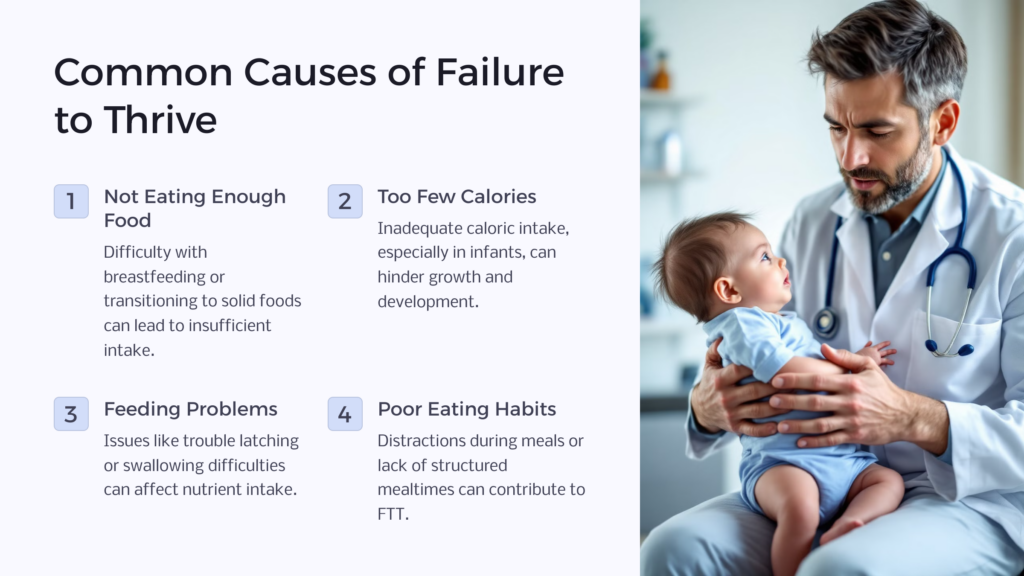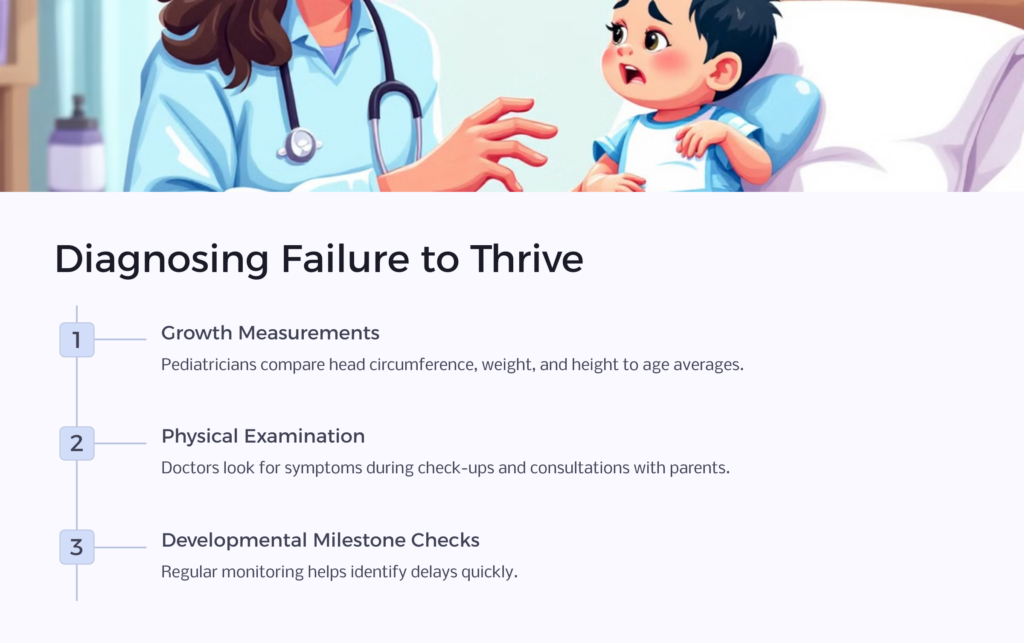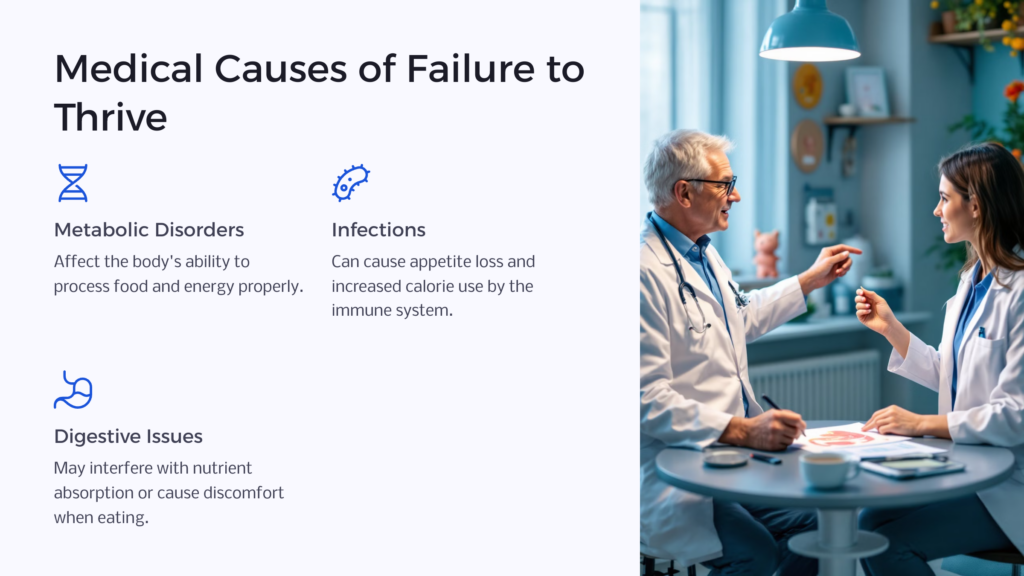While most babies and toddlers develop as expected, they can occasionally fall behind. In some cases, a pediatrician may label this underdevelopment as failure to thrive. Failure to thrive in children is characterized by undernourishment and slower-than-average growth. Several things can cause it, including not eating enough calories and having another medical condition that affects eating habits.

10 Common Causes of Failure To Thrive in Children
- Not Eating Enough Food
- Too Few Calories
- Feeding Problems
- Poor Eating Habits
- Metabolic Disorders
- Emotional Problems
- Digestive Issues
- Infection
- Food Intolerance
- Other Medical Conditions
Pediatricians and other medical specialists typically diagnose failure to thrive in children during infancy or toddlerhood, but the condition can also affect older children. Growth failure as a baby or toddler can signal failure to thrive, and malnutrition is a leading cause. Young children who don’t get the calories and nutrients they need may grow up experiencing developmental delays later on.

To diagnose failure to thrive in children, a pediatrician typically takes into account a child’s growth measurements, including head circumference, weight, and height, and compares those measurements to the averages for the child’s age. A child’s failure to thrive can suggest several potential problems, including malnutrition, child neglect, poor eating habits, or severe gastroesophageal reflux.
What Is Failure To Thrive in Children?
Failure to thrive in children is a blanket term that medical experts use to indicate poor growth in an infant, toddler, or child. A medical problem or feeding issue can lead to a child’s failure to thrive. A child’s healthcare provider monitors their growth through every age to catch this medical problem as early as possible, as it can lead to developmental delay, behavior problems, or physical problems later in life.
Failure to thrive (FTT) is generally categorized as nonorganic failure to thrive or organic failure to thrive. An organic cause is a medically diagnosable issue that causes a child not to eat or absorb nutrients properly. In contrast, nonorganic FTT has non-medical causes, such as inadequate nutrition or child abuse or neglect.

FTT is on the list of child disabilities that could be eligible for Supplemental Security Income (SSI). The SSA accepts FTT with or without a known cause if the child’s pediatrician documents low birth weight, poor weight gain, or delayed overall growth for their age.
What Are the Symptoms of FTT in Children?

Failure to thrive in children can look different in each child, but several common symptoms can point a child’s physician toward an FTT diagnosis. The following symptoms are ones a pediatrician will look for during a physical examination and consultation with a parent or guardian:
Low or No Weight Gain
Perhaps the most common symptom of FTT is not gaining enough weight. Pediatricians use growth charts for specific age ranges to monitor a child’s weight at every check-up.
Children at risk for FTT based on slowed weight gain may have more frequent check-ups than those who meet the benchmarks for their age. A child who isn’t gaining enough weight, especially during the first crucial months of infancy when weight gains rapidly, may have inadequate caloric intake or another feeding issue that signals FTT.
Stalled Growth
Along with a child’s weight, a pediatrician checks the child’s height and head circumference. These measurements give an overview of the child’s growth pattern and determine whether the child is experiencing delayed growth based on growth chart standards. In severe cases, children may be measuring drastically under their peers’ height and weight, typically pointing to an underlying cause.
Excessive Sleepiness
Children with FTT tend to experience excessive sleepiness. It could be more difficult to wake them in the morning or after a nap. They might also fall asleep frequently for more naps than usual during the day. This issue stems from inadequate caloric intake, severe malnutrition, or psychosocial factors that play a role in FTT.
Delayed Development
Delayed motor development means that a child is struggling to hit developmental milestones, whether physical, cognitive, emotional, or social. Depending on the child’s age, this might look like not sitting or standing up without help or not responding to others through gestures or facial expressions.
Pediatricians check developmental milestones at each appointment to ensure that a child is on the right track toward grasping them. This consistent monitoring can help pediatricians pick up on delays quickly.
Irritability
All babies, toddlers, and kids get cranky at times. But if they seem more irritable than not most of the time, it could be a sign of failure to thrive in children. Parents and guardians should watch for signs of excessive irritability, like irritability that affects sleeping patterns or makes it feel impossible for someone to console the child. In toddlers and children, irritability may look more like aggression.
Abnormal Bowel, Urination, and Digestive Habits
Failure to thrive in children sometimes manifests in digestive habits. If a child isn’t eating properly, they may not have as many wet or soiled diapers as they should throughout the day. Older children may go several hours without using the restroom.
Also, some children may experience digestive troubles, like constipation, diarrhea, nausea, vomiting, or belly pain. Consistent vomiting after eating could also stem from gastroesophageal reflux, making it challenging for a child to get the nutrients they need from food.
Behavior or Learning Problems in Older Children

Parents and guardians of children with FTT may notice changing behaviors or learning difficulties from toddlerhood to childhood. Proper nutrition allows children to meet developmental milestones in these areas, whereas malnutrition can delay them, eventually making children fall behind their peers.
Children with FTT may not have typical social tendencies, like playing nicely with others or finding ways to communicate with peers. They also might struggle in school due to problems with memory, staying organized, or paying attention.
10 Common Causes of Failure To Thrive in Children
Failure to thrive in children is often caused by low caloric intake or inadequate nutrition. However, there are several conditions and underlying causes for these issues. The following are common causes of failure to thrive in children.
1. Not Eating Enough Food
Pediatric failure to thrive could spawn from the child not eating enough food. This tends to happen the easiest in breastfeeding newborns and having trouble latching or infants who are switching over to solid food. This can be a challenging time for first-time parents, especially, who are learning about proper nutrition for their baby.
Some toddlers and children may also experience this. Picky eaters can be difficult to feed and may choose to skip meals rather than eat food they don’t like.
2. Too Few Calories
Not eating enough calories can also contribute to failure to thrive in children, and this problem can stem from not eating enough food. Babies, especially, need lots of calories throughout the day to grow and thrive. If they’re not getting the recommended amount from breastfeeding, formula, or solid foods, they may become irritable or excessively sleepy.
For infants, it’s essential to measure out formula correctly to ensure that a baby gets the proper recommended caloric intake at each feeding. This nutritional guide from the American Academy of Pediatrics can help you determine how many calories your child should consume daily based on their age.
3. Feeding Problems
Issues that affect a baby or toddler’s feeding can also lead to failure to thrive. Not producing enough breast milk or trouble getting a baby to latch on are common breastfeeding struggles. Some babies and children may have trouble swallowing, which could make them avoid eating or spit up their food.
Infants and toddlers who are not able to or refuse to eat solid food could also suffer from inadequate nutrition and caloric intake.
4. Poor Eating Habits
Poor eating habits could cause a child’s symptoms. Walking around while eating could prevent a child from eating enough at meals. Sitting in front of the TV or having other distractions around when eating could also play a role.
Kids of all ages may benefit from having structured meal times where family members eat and enjoy their meals together.
5. Metabolic Disorders
Metabolic disorders affect the body’s metabolic process, which could, in turn, affect eating habits. When the body doesn’t metabolize food correctly, a child may not receive the energy they need from the food they eat. These conditions can also cause digestive troubles, making children throw up what they eat or feel sick after eating. In some cases, the side effects contribute to the avoidance of food or not eating as much as needed.
6. Emotional Problems
The living situation or environment or mental health of a child can also spark failure to thrive in children. Children with emotional problems due to abuse or neglect may not get enough food to eat from their parent or caregiver. Children with mental disorders may not have the drive to eat nutritious meals or enough calories throughout the day.
7. Digestive Issues
Children with problems that affect their ability to eat or process food may exhibit symptoms of failure to thrive. If your child shows signs, your child’s physician may refer you to pediatric gastroenterology to diagnose these digestive issues, like inflammatory bowel disease or celiac disease.
8. Infection
Infections require the immune system to attack them. When the immune system ramps up, the rest of the body can experience side effects. Additionally, the condition itself can take a toll on the body, causing stomach upset, diarrhea, and other symptoms. Children may not eat enough calories during an infection, or the immune system could use calories quicker to complete its job. Frequent infections may lead to failure to thrive in children.
9. Food Intolerance
Some children live with food allergies or food intolerances, leading to inadequate nutrition. Food allergies and intolerances can cause children to avoid foods that provide essential nutrients, such as milk and yogurt. In these cases, speaking with your child’s pediatrician or attending nutritional therapy with your child may help suggest other foods to replace those that they can’t eat.
10. Other Medical Conditions
A variety of other medical conditions, like cystic fibrosis, congenital heart disease, and autism, can cause eating and digestive problems that may lead to failure to thrive. It’s important to communicate with your child’s pediatrician and specialists if you believe their symptoms influence the way they eat or prevent them from getting the proper nutrition.
How To Treat Failure To Thrive in Children

Most cases of failure to thrive in children begin with the pediatrician. They’ll monitor your child’s growth at each appointment and act as the middleman between your child and other specialists they might need. The pediatrician may suggest bringing your child in for frequent appointments to check their growth progress.
With the guidance of a pediatrician and a nutrition specialist, parents and guardians can often manage a child’s failure to thrive. In severe cases of malnutrition, additional specialists may need to be involved. Hospitalization is sometimes required if treatments aren’t working.
Depending on the underlying cause of failure to thrive symptoms, a child may see other specialists who can monitor and treat symptoms of various medical conditions. For instance, a child with congenital heart disease also sees a cardiologist, while a child with autism may see an occupational therapist, who can help acclimate the child to different tastes and textures. Children with underlying mental health causes typically see a therapist or psychologist.
How SSI Can Help
The SSI program differs from Social Security Disability Insurance (SSDI), which is only for adults, as it allows children under age 18 to receive a monthly benefit. The SSA includes failure to thrive in children as an acceptable disability to receive SSI. SSI benefits can help low-income families afford nutritious food and other necessities for their child diagnosed with failure to thrive.
Parents and legal guardians may apply online for SSI benefits for their children. If you need assistance with the application, contact the SSA, speak with a disability attorney, or seek a disability advocate in your area. State Disability Determination Services (DDS) may also be able to help you fill out the application.
 Benefits.com Advisors
Benefits.com Advisors
With expertise spanning local, state, and federal benefit programs, our team is dedicated to guiding individuals towards the perfect program tailored to their unique circumstances.
Rise to the top with Peak Benefits!
Join our Peak Benefits Newsletter for the latest news, resources, and offers on all things government benefits.




















